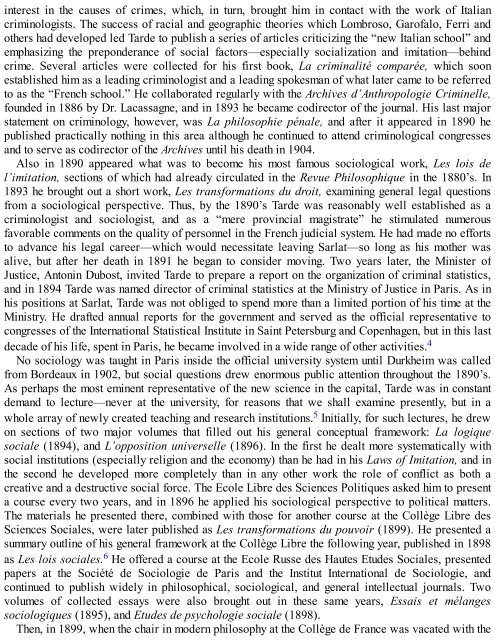3658925934
You also want an ePaper? Increase the reach of your titles
YUMPU automatically turns print PDFs into web optimized ePapers that Google loves.
interest in the causes of crimes, which, in turn, brought him in contact with the work of Italian<br />
criminologists. The success of racial and geographic theories which Lombroso, Garofalo, Ferri and<br />
others had developed led Tarde to publish a series of articles criticizing the “new Italian school” and<br />
emphasizing the preponderance of social factors—especially socialization and imitation—behind<br />
crime. Several articles were collected for his first book, La criminalité comparée, which soon<br />
established him as a leading criminologist and a leading spokesman of what later came to be referred<br />
to as the “French school.” He collaborated regularly with the Archives d’Anthropologie Criminelle,<br />
founded in 1886 by Dr. Lacassagne, and in 1893 he became codirector of the journal. His last major<br />
statement on criminology, however, was La philosophie pénale, and after it appeared in 1890 he<br />
published practically nothing in this area although he continued to attend criminological congresses<br />
and to serve as codirector of the Archives until his death in 1904.<br />
Also in 1890 appeared what was to become his most famous sociological work, Les lois de<br />
l’imitation, sections of which had already circulated in the Revue Philosophique in the 1880’s. In<br />
1893 he brought out a short work, Les transformations du droit, examining general legal questions<br />
from a sociological perspective. Thus, by the 1890’s Tarde was reasonably well established as a<br />
criminologist and sociologist, and as a “mere provincial magistrate” he stimulated numerous<br />
favorable comments on the quality of personnel in the French judicial system. He had made no efforts<br />
to advance his legal career—which would necessitate leaving Sarlat—so long as his mother was<br />
alive, but after her death in 1891 he began to consider moving. Two years later, the Minister of<br />
Justice, Antonin Dubost, invited Tarde to prepare a report on the organization of criminal statistics,<br />
and in 1894 Tarde was named director of criminal statistics at the Ministry of Justice in Paris. As in<br />
his positions at Sarlat, Tarde was not obliged to spend more than a limited portion of his time at the<br />
Ministry. He drafted annual reports for the government and served as the official representative to<br />
congresses of the International Statistical Institute in Saint Petersburg and Copenhagen, but in this last<br />
decade of his life, spent in Paris, he became involved in a wide range of other activities. 4<br />
No sociology was taught in Paris inside the official university system until Durkheim was called<br />
from Bordeaux in 1902, but social questions drew enormous public attention throughout the 1890’s.<br />
As perhaps the most eminent representative of the new science in the capital, Tarde was in constant<br />
demand to lecture—never at the university, for reasons that we shall examine presently, but in a<br />
whole array of newly created teaching and research institutions. 5 Initially, for such lectures, he drew<br />
on sections of two major volumes that filled out his general conceptual framework: La logique<br />
sociale (1894), and L’opposition universelle (1896). In the first he dealt more systematically with<br />
social institutions (especially religion and the economy) than he had in his Laws of Imitation, and in<br />
the second he developed more completely than in any other work the role of conflict as both a<br />
creative and a destructive social force. The Ecole Libre des Sciences Politiques asked him to present<br />
a course every two years, and in 1896 he applied his sociological perspective to political matters.<br />
The materials he presented there, combined with those for another course at the Collège Libre des<br />
Sciences Sociales, were later published as Les transformations du pouvoir (1899). He presented a<br />
summary outline of his general framework at the Collège Libre the following year, published in 1898<br />
as Les lois sociales. 6 He offered a course at the Ecole Russe des Hautes Etudes Sociales, presented<br />
papers at the Société de Sociologie de Paris and the Institut International de Sociologie, and<br />
continued to publish widely in philosophical, sociological, and general intellectual journals. Two<br />
volumes of collected essays were also brought out in these same years, Essais et mélanges<br />
sociologiques (1895), and Etudes de psychologie sociale (1898).<br />
Then, in 1899, when the chair in modern philosophy at the Collège de France was vacated with the









![Genki - An Integrated Course in Elementary Japanese II [Second Edition] (2011), WITH PDF BOOKMARKS!](https://img.yumpu.com/58322134/1/180x260/genki-an-integrated-course-in-elementary-japanese-ii-second-edition-2011-with-pdf-bookmarks.jpg?quality=85)
![Genki - An Integrated Course in Elementary Japanese I [Second Edition] (2011), WITH PDF BOOKMARKS!](https://img.yumpu.com/58322120/1/182x260/genki-an-integrated-course-in-elementary-japanese-i-second-edition-2011-with-pdf-bookmarks.jpg?quality=85)





